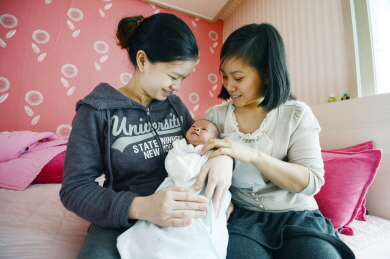
Established in 2013, Danurimom is a business that provides postnatal services to immigrant women of multicultural families living in Korea. The name Danurimom is a compound term putting together the Korean word “Danuri,” which means a service every member of a multicultural family can enjoy, and the English word “mom.” It conveys that the service provided by Danurimom is open to all multicultural women.
Originally, Danurimom was a project of the Enactus program in Sungkyunkwan University. The project continued for three years, and the time eventually came to decide whether Danurimom was going to stay as a mere school project or become established as a proper business. Han Man-hyung, who was the manager of the initial project and now the vice-president of Danurimom, decided to incorporate the project into an official business.
“At first, I hesitated to convert Danurimom into a business, as the project felt like a simple volunteer work,” Han said. “However, I realized that to those women whom we have helped, the service wasn’t just about getting a help for once – their whole lives had been greatly affected. So I felt the need to step up and take responsibility to incorporate the project.”
The main goal of Danurimom is to provide multicultural mothers with personal postnatal care by women from the same cultural background. Postnatal care is different in every culture. The lifestyle and food varies according to each culture. Therefore, by pairing mothers with professionals of postnatal care from the same culture, multicultural mothers can receive care that best suits them.
“The period after giving birth is one of the most sensitive times for women, both mentally and physically,” Han said. “Exposure to other women from the same background not only provides suitable postnatal care, but also gives them a sense of psychological stability as they can have a chance to talk deeply and form friendship, which is usually quite difficult for foreign women in Korea.”
Foreign mothers can apply for the postnatal service through the Web site (http://www.danurimom.or.kr/). For convenience, the website is accessible in four languages; English, Chinese, Japanese and Vietnamese. The price is affordable compared to that of other Korean postnatal services, charging 420,000 won for six days for mothers with a single baby. The price is varied according to the duration of postnatal care and number of babies.
Although it seems as if Danurimom is aiding only multicultural mothers, it is in fact trying to help multicultural women as a whole. Danurimom hires their professional postnatal caretakers via open recruitment, providing a chance for all multicultural women women to apply. The women selected from the recruitment should have experience in giving birth, and they have to be fluent in both Korean and their native language. Then, they get trained according to the guidelines from the Ministry of Health and Welfare. After the training, they are hired as an official employee.
“In Korea, there is a tendency to look down on women from different cultures, mostly because people believe that the foreigners are from poor countries,” Han said. “There are many ways to change this view, such as education and campaigns. However, I feel like such methods would take forever to change people’s attitudes. Instead, Danurimom gives multicultural women proper jobs that only they are qualified to do. This not only helps increase self-esteem and self-achievement, but also show their capabilities to others in Korea.”
In the future, Han hopes to run the company with multicultural women directly participating in the management of the business.
“When multicultural women are part of organizing a business, people will definitely think twice about the skills of foreigners and their own attitudes they should have toward women from different cultures,” Han said. “Moreover, this business is perfectly suited for these women to run as they are the only ones who could understand multicultural mothers thoroughly.”
Lim Ye-ju
yejulim@ewhain.net

